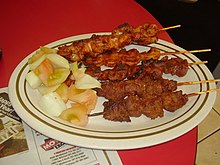
Back مطبخ نيجيري Arabic নাইজেরীয় রন্ধনশৈলী Bengali/Bangla Gastronomia de Nigèria Catalan Nigerijská kuchyně Czech Gastronomía de Nigeria Spanish آشپزی نیجریه Persian Cuisine nigériane French Abincin Najeriya Hausa Hidangan Nigeria ID Nri Naijiria IG
| This article is part of a series in |
| Culture of Nigeria |
|---|
 |





Nigerian cuisine consists of dishes or food items from the hundreds of Native African ethnic groups that comprises Nigeria.[1][2] Like other West African cuisines, it uses spices and herbs with palm oil or groundnut oil to create deeply flavored sauces and soups.[3]
Nigerian feasts can be colourful and lavish, while aromatic market and roadside snacks cooked on barbecues or fried in oil are in abundance and varied. Bushmeat is also consumed in Nigeria. The brush-tailed porcupine and cane rats are the most popular bushmeat species in Nigeria.[4][5][6][7]
Tropical fruits such as watermelon, pineapple, coconut, banana, orange and mango are mostly consumed in Nigeria.[8][9][10][11]
Nigerian cuisine, like many West African cuisines, is known for being savoury and spicy.
- ^ Oyibo, Emmanuel (2020-04-15). "Top 20 Nigerian Foods That Will Blow Your Taste Buds". Chef's Pencil. Retrieved 2022-05-17.
- ^ "Nigerian Food: 16 Popular and Traditional Dishes to Try". Nomad Paradise. 2020-08-10. Retrieved 2022-05-17.
- ^ "Facts about Nigerian Soup". Ofefoods Limited. 2021-07-08. Retrieved 2022-05-17.
- ^ Jori, F.; Edderai, D.; Houben, Patrick; Paoletti, M. (7 January 2005). "Potential of Rodents for Minilivestock in Africa". Ecological Implications of Minilivestock. CRC Press. pp. 39–60. doi:10.1201/9781482294439-9. ISBN 9780429078590.
- ^ Jori, F.; Edderai, D.; Houben, P. (2005). "Potential of rodents for minilivestok in Africa". In Maurizio, M. G. (ed.). Ecological Implications of Minilivestock. Enfield, NH: Science Publishers. pp. 25–45. ISBN 1-57808-339-7.
- ^ Friant, Sagan; Paige, Sarah B.; Goldberg, Tony L. (2015-05-22). "Drivers of Bushmeat Hunting and Perceptions of Zoonoses in Nigerian Hunting Communities". PLOS Neglected Tropical Diseases. 9 (5): e0003792. doi:10.1371/journal.pntd.0003792. ISSN 1935-2735. PMC 4441483. PMID 26001078.
- ^ Kamgaing, Towa Olivier William; Dzefack, Zeun's Célestin Brice; Yasuoka, Hirokazu (2019). "Declining Ungulate Populations in an African Rainforest: Evidence From Local Knowledge, Ecological Surveys, and Bushmeat Records". Frontiers in Ecology and Evolution. 7. doi:10.3389/fevo.2019.00249. ISSN 2296-701X.
- ^ Oktay, Serdar; Sadıkoğlu, Saide (June 2018). "The gastronomic cultures' impact on the African cuisine". Journal of Ethnic Foods. 5 (2): 140–146. doi:10.1016/j.jef.2018.02.005.
- ^ Fadeiye, E. O.; Popoola, B. R.; Emuoke, D. K.; Adeoye, T. A.; Ogundana, M. T. (2019). "Factors Influencing Fruit Consumption Among Undergraduates in Obafemi Awolowo University, Ile-Ife, Osun State, Nigeria". Ife Journal of Agriculture. 31 (2).
- ^ "Nigerian delicacies". www.mynigeria.com. Retrieved 2022-05-17.
- ^ Onyeakagbu, Adaobi (2022-10-25). "You probably didn't know the names of these popular Nigerian fruits". Pulse Nigeria. Retrieved 2022-12-10.